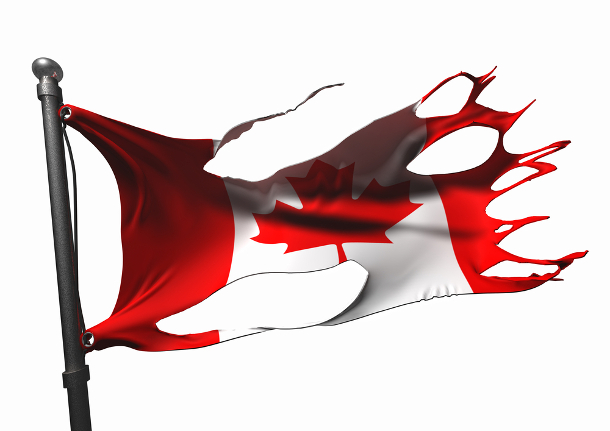Harper’s Revolutionary Foreign Policy
Bellicose words, pandering flip flops, just one aim: Win votes at home.

Shredded by vote-driven strategy, Canada’s foreign policy has no real conservative agenda, no moral centre. Canadian flag image via Shutterstock.
No Canadian prime minister has put his personal stamp on foreign affairs more than Stephen Harper. And no prime minister has parted so radically from the national traditions of the past.
Canada used to play the role of a noble and sometimes self-serving Boy Scout abroad. The nation brokered peace deals, elevated the status of women, fought international poverty, championed arms control, and shared critical science.
It practiced real diplomacy and in the process, as former prime minister Joe Clark wrote in How We Lead, the nation became a “reliable, respected and responsible” global partner that built “concentric circles of influence on issues from defence, to development, to conciliation, to trade.”
There were blind spots, of course. The nation often ignored the abuses of Canada’s mining industry abroad and championed secret trade deals that have given unfettered power to corporations.
But the Boy Scout is long gone and a bully has taken its place. The Harper government practices “megaphone diplomacy” and flits from one outrageous rhetorical outburst to another.
One day Harper harangues Vladimir Putin as a common criminal, while the next day his Tory minions compare Iran to Nazi Germany. Canada has morphed from the reasoned voice of a middle power to a brittle fear monger that is now the first to close embassies, cut off dialogue and impose sanctions.
At the same time the Harper government can ignore the Syrian refugee crisis, because as Harper routinely suggests, many of these people might be terrorists or God forbid, homeless Muslims.
At first glance, much of this bombast (The Globe and Mail ridiculously calls it “muscular”) might seem totally incoherent and inconsistent, and you’d be right.
…click on the above link to read the rest of the article…